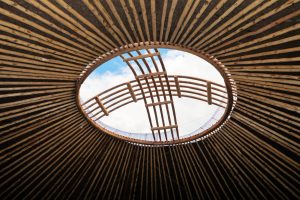Just weeks after his release from prison, poet and dissident Aron Atabek died of complications following a COVID-19 infection on November 24, sparking mourning and poetry readings in Almaty, Kazakhstan’s largest city.
Atabek, 68, had been released from prison on October 1, 15 years into an 18-year sentence. He always rejected his conviction, saying he did not recognize the court that found him guilty of “organizing a mass riot,” “hostage-taking,” and “murder with aggravating consequences” in relation to the death of a policeman.
In 2006, when police had moved in to ensure the demolition of a shanty town at the edge of Almaty, Atabek was an advocate standing against the bulldozers. Around 4,000 people, most of whom were escaping homelessness, lived in the “illegal settlement” known as Shanyrak. Ironically, “shanyrak” is the name of the grid-shaped figure that the wooden structure forms at the top of a Kazakh yurt, perhaps the most evocative symbol for shelter, family, and nation in Kazakh culture. A stylized version of a shanyrak lies at the center of the official emblem of Kazakhstan.
Soon after the turmoil, authorities arrested Atabek, who was sentenced months later along with two dozen others for the riots, which essentially had become a struggle between homeowners and developers.
In a poem written in prison in 2014, Atabek wrote:
I left the hut
And went to fight,
So that the land in “Shanyrak”
Would be given to the homeless.
During his years behind bars, Atabek also cumulatively spent about three years in solitary confinement: two years from 2010 to 2012 and between 2012-2013. In December 2012, his writings, titled “The Heart of Eurasia,” appeared online after being smuggled out of the prison. According to his supporters, Atabek’s stark criticism of then-President Nursultan Nazarbayev could have been the motive behind his worsening prison conditions.
He also accused his guards of mistreatment and torture, sparking an international campaign for his release.
Freedom of expression advocates at PEN International, an organization that defends writers who are harassed, imprisoned, or killed for their views called for his freedom for years.
His release in October on deteriorating health grounds came as a surprise, as Kazakhstan’s authorities had never granted him any clemency before and he continued to refuse to seek a pardon because it would require admitting guilt.
In his first interview out of prison, Atabek claimed to have been the victim of a hoax.
“This ended up being a deception from the cops,” Atabek told Radio Azattyq, describing his transfer from a prison in Pavlodar, in the north of the country, to his home in Almaty, in the south. According to Atabek, the guards refused to tell him that he was being released until he was on his way to the airport.
Images shared online after his release – which came days after a hospital visit – showed an emaciated Atabek, weakened by years of hardship in prison. Only three weeks later, on October 21, Atabek was transferred to an intensive care facility, where he remained until his death.
In the days following his death, his family organized a wake, which was attended by hundreds of supporters and sympathizers. On November 28, activists gathered around Abai Square in the center of the city to read Atabek’s poems. While tightly controlled by police and security service, the gathering was not dispersed.
At his core, Atabek was a nationalist. He was on the square in December 1986 when students and activists in Almaty protested the appointment of Gennady Kolbin, an ethnic Russian, to head the Kazakh Soviet Socialist Republic. The police repression of the riots turned the events into a dark page in the country’s history. During “Jeltoqsan” (December in Kazakh), the authorities ordered a violent repression of the demonstrations, which resulted in several dead. The Soviet establishment never allowed for a transparent investigation and trial over the violence.
On the eve of independence in 1991, Atabek was instrumental in the creation of the Alash National Independence Party, which took inspiration from a political organization by the same name in existence between 1917-1920.
In the 1990s, fearing repercussions for his political positions, he continued his activism from Russia and Azerbaijan. He returned to Kazakhstan in the early 2000s and founded the public association “Kazakh Ulty” (Kazakh Nation), through which he criticized Nazarbayev, at a period of heightened political struggle.
In fact, in the mid-2000s Kazakhstan’s most important oil contracts were finally drawing financial windfalls, while Nazarbayev was consolidating his power in the face of growing opposition movements. Furthermore, the economy’s reliance on the U.S. dollar and the housing boom in Almaty were a foreboding tale of the long-lasting effects of the global financial crisis of 2007. The Shanyrak events were essentially an explosive cocktail, the product of the unstable situation in the country.
The repression of opposition movements, the arrest of Atabek, and later on the violent reaction to the strikes in the oil town of Zhanaozen were stepping stones in the consolidation of Nazarbayev’s grip on power and the insurance policy on a season of political stability.































